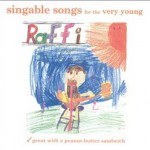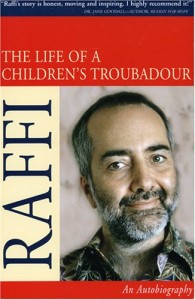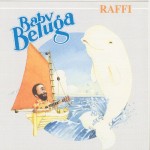Raffi has been called “the most popular children’s singer in the English-speaking world”. It all started with his 1976 album Singable Songs for the Very Young, which includes songs “The More We Get Together”, “Down By The Bay”, “Willoughby Wallaby Woo”, and “Going to the Zoo”, and which was notable for bringing the highest quality in recording and production to children’s music. He went on to release many other hugely popular children’s albums, and along the way wrote classics including “Baby Beluga” and “Bananaphone”.
Raffi is also a passionate advocate for children, and co-founded the Centre for Child Honouring which works to restore communities and ecosystems by addressing the universal needs of children. He has been honored as a recipient of the Order of Canada and the United Nations’ Earth Achievement Award.
The following is from a phone interview on 3/26/13 for a preview article for his concert in Santa Barbara on 4/7/13.

Jeff Moehlis: What can we look forward to at your upcoming concert in Santa Barbara?
Raffi: It’ll be a whole lot of singalong fun. I’ll be singing the favorites that the fans know and love, plus throwing in a few fun surprises as well. Did I mention that there will be a lot of corny humor?
JM: Sounds great. Have you ever performed in Santa Barbara before?
R: Oh yes, I certainly have. It’s always been fun, and I look forward to another really good time. This time it’ll be different because the Beluga Grads will be in attendance. You know what I mean by Beluga Grad?
JM: Not really.
R: Well, there are an estimated ten million Raffi fans now who have grown up, and many of whom have kids of their own. Those who have sung “Baby Beluga” as children and who are now adults, I call them Beluga Grads. They’re between eighteen and forty.
JM: I understand that this show will benefit for the Centre for Child Honouring, that you founded. Can you tell me a little bit about that Centre?
R: The Centre works to advance a universal ethic of honoring the child as the best way to create humane, and therefore sustainable cultures, peacemaking cultures. And we say that how we treat and regard the very young is the key to positive outcomes for a lifetime, in productivity, personal happiness, resourcefulness. So it makes sense that when we attend to the formative needs of the very young, and these needs are universal in growing children, when we meet their formative needs they can give us the best of themselves and they can feel the best, as well. It’s a win-win.
Our slogan is Respecting Earth And Child, because we feel that that makes total sense. You respect the child, you have to respect the Earth’s habitat, the planetary habitat that gave birth to this person. So the Centre as a beneficiary of these concerts, it’s a very happy situation. It’s a gentle way for my family audience to find out about what I’ve been doing in the last ten years.
JM: Going back a bit, how did you get into writing and performing children’s music?

R: I have a lot written about this. In fact, I wrote an autobiography called The Life of a Children’s Troubadour, released back in 1999. But it all began for me on a nursery school floor in north Toronto. When I was married for a time to a Kindergarten teacher, a marvelous, compassionate woman, she taught me all about the young child as a whole person. And so respect for the young child as a whole person has been the hallmark of my career.
That’s why I have not done any commercial endorsements of any kind throughout the three or four decades that I’ve been doing this work. That’s why I’m against all direct advertising and marketing to children, because it’s not ethical. I call on America to ban that practice of direct marketing to children, just as a number of Scandinavian countries have done, as the Province of Quebec has done. You can’t advertise to kids twelve and under in Quebec.
JM: How do your songs typically come together, or is there a typical?
R: Well, I’m singing songs that I’ve recorded throughout my career. The favorites are “Baby Beluga” and “Bananaphone”, “Down By The Bay”. All kinds of fun songs. I don’t write children’s songs currently because I’m also doing other work. I’ve been writing a book lately, actually.
JM: What’s that about?
R: The book is about social media, and how we need to reform it so the young users can be safe. The book is called Lightweb, Darkweb: Three Reasons to Reform Social Media Before It Re-Forms Us. I’m writing it because social media in a few short years has changed every relationship in every social unit. The unanticiptated young users now, many of them can’t use the service safely. So while parents have a duty to guide their young, and how to navigate the Internet safely and wisely, I feel that it’s the social media providers who have the responsibility to make systemic safety changes so that young users can feel safe. It shouldn’t be up to the user. It should be up to the social media companies that create the risk for young users in the first place.
JM: It’s great that your such a strong advocate for children in so many ways.
R: Thank you. Let me say one more thing about that, if I may. Back in October, a Vancouver-area teen Amanda Todd, fifteen years old, took her own life after being mercilously hounded on Facebook. So this book is in response to that tragedy, and, in fact, I also co-founded a grassroots movement calling for safety for young users online. The movement is called Red Hood Project, and the website is redhoodproject.com. We are asking everyone to be a signatory, to co-sign if you will an open letter that we wrote to Facebook COO Sheryl Sandberg. We wrote that letter back in October, and it was co-signed by Amanda Todd’s mother Carol Todd, and a number of distinguished Canadians. And more and more people are signing on to that letter now. Ms. Sandberg still has not responded to us.
JM: What, in your opinion, makes a children’s song good? Or is that possible to answer?
R: [laughs] Well, you know, songs that appeal to a child’s imagination, songs that are funny, tickle your funny bone, songs that are singable for a child, and songs that are real, about things that are real in a child’s life. You can sing about favorite foods, you can sing about bananas. The imagination comes in when it’s “Bananaphone”, you see? Kids love to sing, they love the natural world, they love animals, they love humor, they love rhyming. You can have a lot of fun, as I’ve done over the years.
JM: Do you follow any of the new generation of children’s songwriters?
R: I’m not familiar with their work, actually, possibly because I’ve been so busy with the work of the Centre for Child Honouring. It’s takes a lot to keep a non-profit organization going, and also to get the word out there that society, for its own good, has a lot of work to do.
You know, Jeff, we live in a society that often is predatory when it comes to selling products to the young. Companies have teams of psychologists who think of nothing else but how to hook a young consumer from birth. Brand identification, and later on direct marketing through television shows and that kind of thing, the multi-billion industry that markets to the young. So along with our colleagues at Campaign for a Commercial-Free Childhood, my colleague there Susan Linn, we work to make parents aware that children deserve our best. It’s unjustifiable to have an economic system that exploits the young for profit. If it’s morally repugnant to exploit innocence, why is it legal? That’s the question we ask people. We cannot let corporations do that to our young. It is simply not ethical.
JM: What advice would you give to an aspiring musician?
R: [laughs] Well, always in the arts it’s “follow your heart”. Do what you must. Do it with love and joy, and if you love what you do you’ll work hard at it, as I did. And I still do [laughs]. But follow your heart.
JM: And I assume that’s the case if you’re a children’s musician or a musician for adults?
R: Yeah. You need to have a sense of who your audience is. If your audience is the very young, then you’ve got an extra responsibility to know what the young are like as people. I mean, they’re varied of course. They’re individuals. But young children share common traits, so you need to know what that time of life is like, and what it’s not like. Because children are not little adults. They’re unique citizens of a certain time in the life continuum. I certainly did a lot of learning when I was younger about how kids are and what they enjoy, and how to reach them, how to communicate with them. I think every aspiring children’s entertainer can do the same.
JM: It sounds like you have a lot on your plate, with a new book coming out, and you’re involved with various non-profit activities. Any other plans that you’re willing to disclose?
R: Not at the moment, because the Red Hood Project also takes some of my time. I say to anybody in your audience, I call on the Oprah’s of the world, and the Bill Gates’ of the world, to come to the protection of young children. Because we’ve got more and more, millions of kids under thirteen on Facebook and other social media sites. I don’t mean to single out Facebook. And they’ve got to be protected. And yes, parents have a role in that, and I acknowledge that. But all the parents that I speak to tell me that it’s an impossible job to be adequately supervising and looking over the shoulder of their kids. And you don’t want families to turn into surveillance states, you know? So, we need influential public figures to come out and demand systemic safety from social media companies.
JM: I have to ask, do you have a favorite amongst the songs that you wrote or perform?

R: Probably “Baby Beluga”, because it has struck such a chord with so many millions. I love beluga whales. They’re just the most amazing creatures in the world. Very childlike, too. They seem to have a smile on their face, and they’re known as singers. Fishermen used to call them “sea canaries”, they’re so loquacious. My other favorite would be “Bananaphone”.
JM: Where are you speaking to me from?
R: I’m speaking from the Centre for Child Honouring office in Salt Spring Island, Canada. It’s on the west coast in British Columbia Province. So you might say I’m just up the coast from Santa Barbara.


Discussion
No comments for “Interview: Raffi”